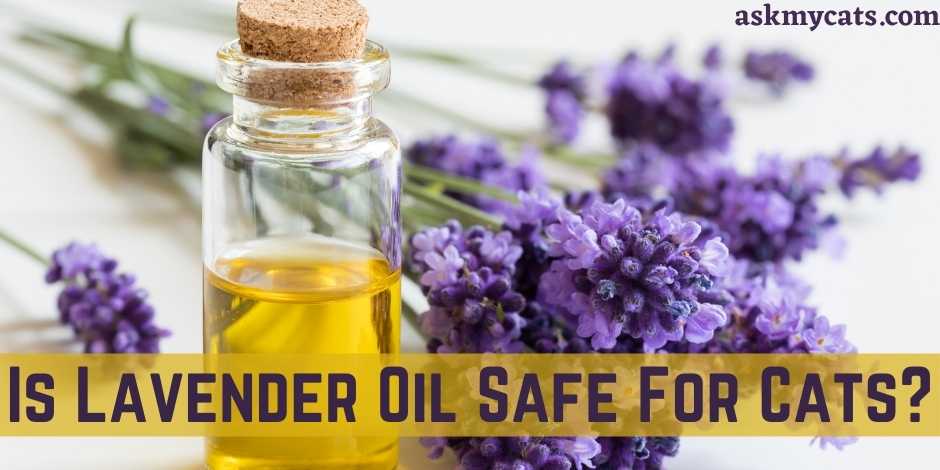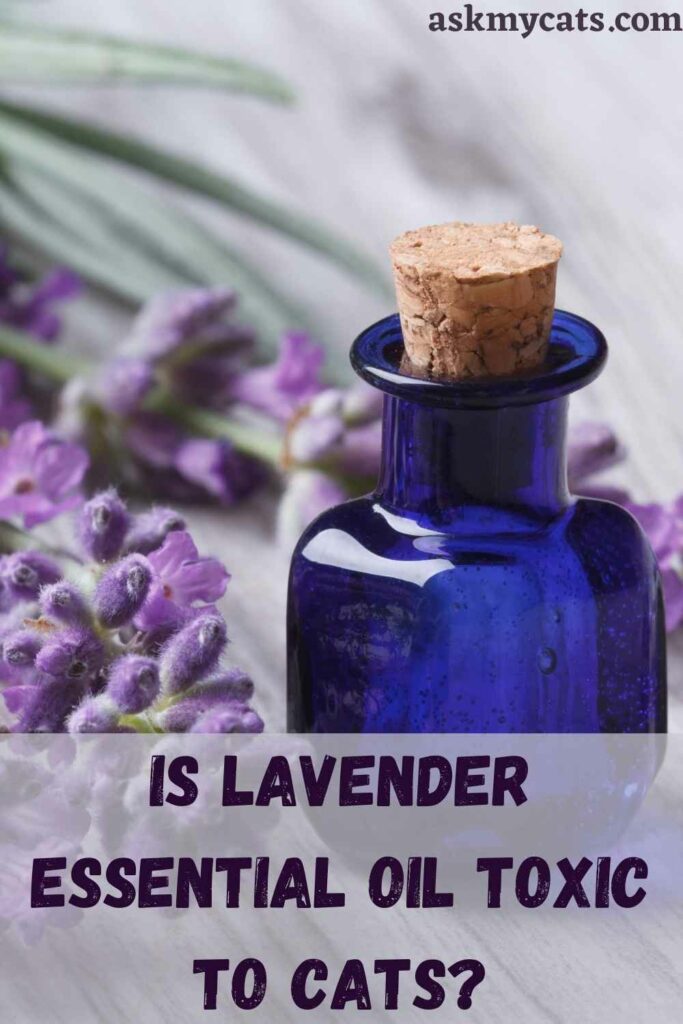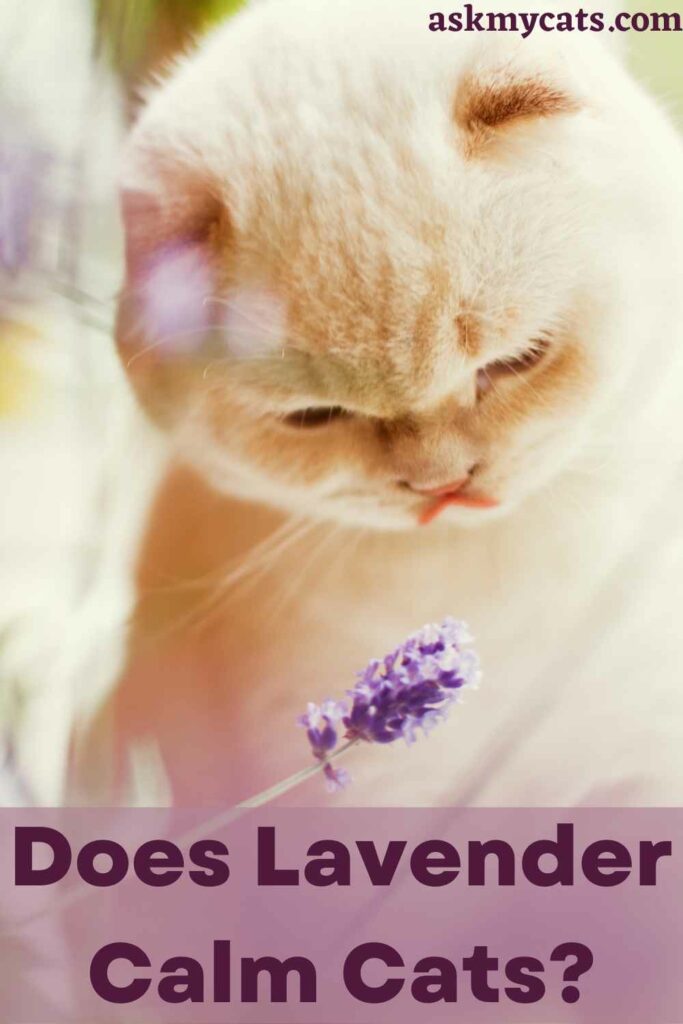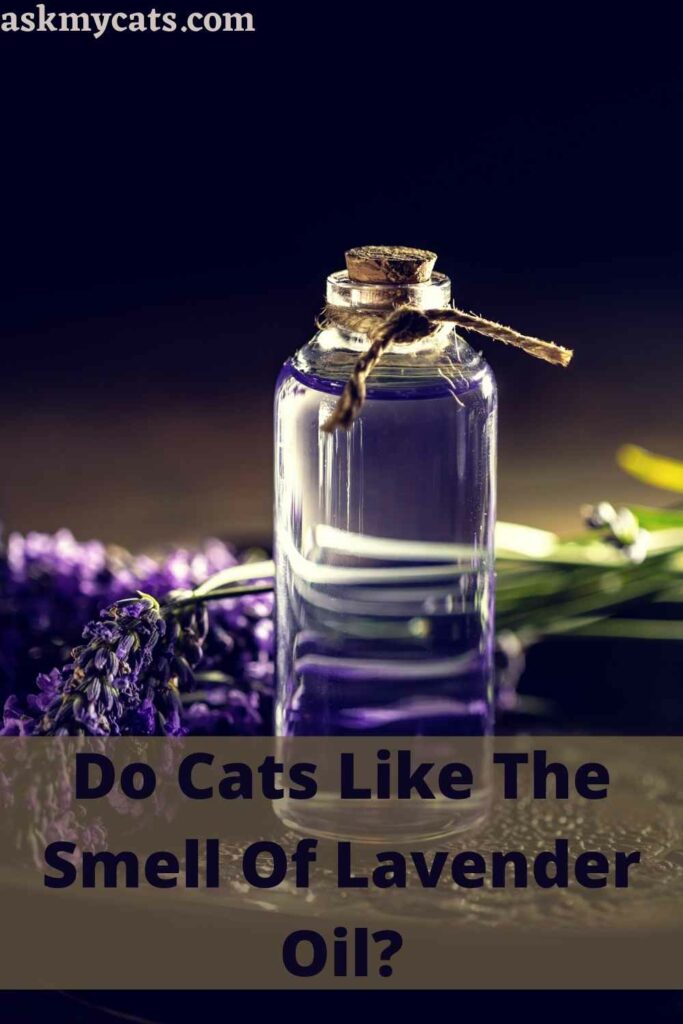Lavender has made its way into our lives in the form of herbal remedies, oils, skin care products, and wellness treatments. Lavender oil is one of the most widely used essential oils in most homes. Humans may benefit from the calming scent in terms of stress and anxiety relief.
However, is lavender oil safe for cats?
No, lavender oil is not safe for cats according to the ASPCA. A cat should never be fed lavender essential oil, and it should never be left where curious little tongues can lap at it. A cat’s liver is simply incapable of breaking down the chemicals in essential oils
This article will talk about is lavender oil safe for cats and how to use it around cats.


Give Your Cat the Perfect Day
Get the Free Ebook!
Is Lavender Essential Oil Toxic To Cats?
Yes, the lavender essential oil is toxic to cats.

Fragrant lavender plants adorn window sills, indoor spaces, and gardens in many homes across the country.
Lavender is frequently used in a variety of formulations and is available in the form of oils, sprays, and diffusers.
All of these are toxic to cats in varying degrees, depending on the amount of time they are exposed to them.
According to Dr. Jamie Richardson, medical chief of staff at Small Door Veterinary in New York City, the lavender plant is not harmful to cats unless it is ingested.
“Some cats appear to enjoy sitting in or near outdoor lavender plants,” she adds.
“Most cats will not ingest lavender plants voluntarily, but if they do, they can cause gastrointestinal upset (usually vomiting).”
According to experts, cats can become ill simply by licking a lavender plant and not fully ingesting it. This also applies to dried lavender spike potpourri.
The most toxic form of lavender for your cats is lavender essential oil. “Cats are more susceptible to essential oils than other species because they lack a specific enzyme in their liver that aids in the metabolization of certain drugs, including essential oils,” explains Richardson.
“In addition to the dermal absorption that can occur quickly, cats will frequently groom off foreign substances that have been applied to their coat, ingesting the oil.”
Although lavender oil diffusers and sprays contain low levels of lavender, they can still enter your cat’s respiratory system.
According to Richardson, while there have been few studies on the long-term effects of essential oils on humans or animals, there is no clear evidence of a safe level of exposure.
“We do know that cats can be extremely sensitive to even passive, diffused aerosolized products, causing respiratory irritation in their lungs and resulting in asthma,” she says.
Cats can become lavender poisoned by licking droplets from diffusers and sprays that have fallen on their fur. “Essential oils in active diffusers (which release micro droplets into the environment) or sprays can fall onto a pet’s fur coat and be absorbed through the skin or ingested during grooming,” warns Richardson.
What Does Lavender Oil Do To Cats?
If your cat has ingested lavender oil you can see the following symptoms: –
- Drooling
- Gastrointestinal signs such as vomiting and diarrhea
- Inappetance (refusal to eat)
- Lethargy
- Neurological signs such as staggering, stuporous or drunk like behavior, and tremors
- Decreased respiratory rate, asthma, or aspiration pneumonia
- Changes to heart rate/rhythm
- Liver failure
According to experts, there is no established toxic dose for lavender oil. It depends on each individual cat’s sensitivity to it and route of exposure.
Your cat may experience gastrointestinal symptoms rapidly, within the first three hours of exposure or ingestion. However, Experts states that liver or kidney damage can take several days to become apparent via blood tests.
Essential oils, when inhaled, can also cause aspiration pneumonia, according to experts. Aspiration pneumonia is a lung infection caused by the inhalation of foreign material into the cat’s lungs.
It is most commonly associated with regurgitation or vomiting, both of which accompany lavender poisoning.
If you notice your cat has come into contact with a lavender product, experts recommend bathing your cat to remove as much of the product as possible.
Your next step should be calling the ASPCA’s poison control hotline (888-426-4435) at any time of day or night for additional information specific to the case.
They will be able to advise you on whether it is safe to monitor your cat at home, or if you should get to your nearest vet ASAP, and the appropriate next steps that can be taken.
If your cat exhibits respiratory changes such as rapid breathing, coughing, and/or watery eyes after coming into contact with lavender oil/spray/diffuser, it is advised to move the cat to a fresh air environment and contact your veterinarian.
If you suspect lavender poisoning in your cat based on the symptoms listed above, take him to a veterinarian for a thorough examination and treatment.
If only a few drops come into contact with your cat, a quick and thorough bath may suffice. However, if you notice any more, suspect aspiration or ingestion or your cat is exhibiting symptoms of lavender poisoning, contact your primary care veterinarian immediately.
For cats diagnosed with lavender toxicity, a physical examination and possibly hospitalization for blood samples and IV fluids may be required.
Medications can help calm the gastrointestinal upset and/or heal the liver and kidneys, depending on the results of the exam.
Must Read: Does Lavender Keep Cats Away?
Does Lavender Calm Cats?
Yes, lavender can calm cats. It is also safe to use as long as your cat does not consume it.

While essential oils are popular among humans, they can be harmful to cats because they metabolize them differently.
Only a few are thought to be safe for cats. Lavender, which has natural sedative properties, may be useful in calming an anxious cat.
Cats are also said to be safe around copaiba, helichrysum, and frankincense.
Check with your holistic veterinarian for recommendations before using essential oils around your cats.
Scents such as lavender can be used to treat your cat’s anxiety or stress.
However, because many essential oils are toxic and potentially fatal, you must exercise extreme caution.
Lavender is well known for its sedative and calming effects on humans. You can also use this oil to help your cat relax and calm down.
If your cat becomes anxious before or during travel, for example, you could use lavender essential oil to calm him down.
Geranium essential oil is a good alternative to lavender essential oil for calming your cat during stressful events and situations like car rides.
Can Lavender Oil Kill Cats?
Yes, lavender oil can kill cats if ingested because of its concentration.
While the lavender plant itself is not toxic to cats, lavender-based formulations can be. Your cat can eat a lot of lavender and only get an upset stomach, but lavender essential oil can be fatal to your pet due to its concentration.
Because a cat’s liver lacks several specific enzymes that aid in the safe processing of volatile compounds found in essential oils, these should be kept away from your cat.
Do Cats Like The Smell Of Lavender Oil?
Whether a cat likes the smell of lavender oil or not, is dependent upon its personality as each cat is different.

Lavender’s aroma attracts cats, just as it does us, humans, by luring them in to sniff and rub against it.
However, its attracting power is not as strong as other pant-like catnip, and some cats may not show the same level of interest.
However, many people believe that this is a smell that cats despise. The reasons for this are unknown.
It’s possible that the reasons are genetically related to catnip or simply a matter of personal preference on the cat’s part.
If your feline companion is a fan of this scent, you can use it to help them relax.
The use of this natural therapy, along with other relaxing factors and the discovery of the cause of the problem, has been shown to help the animal feel much calmer, especially in cases of anxiety and a small degree of aggressiveness.
Essential oils are disliked by cats. Any essential oil can be too overpowering for them because their sense of smell is so strong.
Don’t go overboard with the scents that are supposed to be soothing to cats. It might be able to imitate the pleasant scent of fresh lavender if used in a diffuser or heavily diluted.
However, there is one stipulation when it comes to lavender and cats. The cat is poisoned if it eats the plant. It’s critical that the cat can’t eat the flowers or leaves.
Is Lavender Oil Safe For Cats To Breathe?
Yes, lavender oil is safe for cats to breathe, but only it is diluted.
Lavender oil is one of the most common essential oils that is safe to use on your cat when diluted. Because lavender oil used in a diffuser is highly diluted, it should not be a problem for your cat if you diffuse it in your home (versus direct topical application or dietary supplementation).
You should never leave your cat alone in a room where essential oils are being diffused. Always make sure the cat has a way out of the room to avoid the diffuser.
Is Diluted Lavender Oil Safe For Cats?
No, diluted lavender oil is not safe for cats.
Your cat’s liver is deficient in several enzymes that allow it to break down certain substances, such as essential oil components and liquid potpourri.
Linalool and linalyl acetate are found in lavender plants. Your cat’s gastrointestinal system may be upset by these substances.
Even a diluted massage oil can cause mild stomach upset, so keep your cat away from lavender plants and anything made with lavender.
Every day, your cat requires attention, playtime, and the opportunity to safely explore its surroundings. If it does not have these opportunities, it will become bored and may become ill as a result.
Even if your cat hasn’t become symptomatic after ingesting lavender, you should contact your veterinarian. Do not force your cat to vomit if you suspect it has gotten into your potpourri or essential oils, as the ingredients can burn its digestive tract.
Instead, place the lavender, potpourri, or essential oil in a sealed plastic bag and give it to your veterinarian for testing and examination.
How Do You Dilute Lavender Oil For Cats?
The best way to dilute lavender oil for cats is to mix it with 9 parts of carrier oil with 1 part lavender oil.
Before using lavender essential oils topically on your cat, always check with your veterinarian. This will help you avoid accidentally using a product that could harm your beloved four-legged friend.
Also, keep in mind that lavender oil should never be given to cats because it is toxic. This includes not putting it on your cat’s legs or paws, where it could be licked.
It’s also important to remember that these oils must be diluted first. Use a carrier oil that you know is safe for cats, and if you have any questions, seek professional advice.
Most pet-friendly oils require at least 1 drop of pure lavender essential oil to 50 drops of pure carrier oil for proper dilution. Keep in mind that even the safest essential oils can irritate the airways if inhaled.
Frequently Asked Questions
How to keep the cat away from lavender?
Keep lavender out of cats’ reach. Lavender sprigs, both fresh and dried, should be kept out of reach of your cats. Grow cat-friendly plants such as catnip and oat grass (cat grass), as well as herbs such as valerian, Cat’s Claw, and licorice root. Lavender oil and skincare products should be kept locked away. If you use lavender oil or lavender-infused skincare or bath products, keep them in a locked cabinet out of reach of your cat. After using any lavender skin products, don’t let your cat lick the diffuser sticks or your skin.
Can lavender oil repel fleas?
Keep in mind that whatever you put on your cat’s body could end up in his or her mouth. Cats groom themselves with their tongues. If you really want to give lavender oil a try as a flea repellent for your cat, go for commercially produced products rather than making your own. Instead, spread lavender thinly or tuck it between cushions on flea-infested carpets and furniture where your cat is unlikely to ingest it.
How is lavender poisoning in cats diagnosed?
Even if your cat hasn’t become symptomatic after ingesting lavender, you should contact your veterinarian. If you think it got into your essential oils, don’t force your cat to vomit because the ingredients can burn its digestive tract. Instead, place the lavender, potpourri, or essential oil in a sealed plastic bag and give it to your veterinarian for testing and examination. Your cat will receive a full physical examination from your veterinarian, which will include a urinalysis and blood work. These will inform your veterinarian about how lavender and related products are affecting your cat, allowing them to devise the best treatment plan. The veterinarian will look for signs of liver or kidney damage in particular.
Final Words
While lavender is not the most toxic substance, it is not something your cat requires. Keep the essential oil, in particular, away from your four-legged friend. It’s a good natural flea repellent, but you should probably use it on your carpets and furniture instead of your cat.
If you have any unanswered questions, ask us in the comments section.

Hi
If I use concentrated lavender essential oil onto my beds, will the smell harm my little kitties?
Thanks in advance.
No essential oils are derived from plants. And lavender in itself is not harmful to felines.
Interesting read, thank you. I thought essential oils go into the bloodstream when topically used.
I am glad this article could be of help to you.